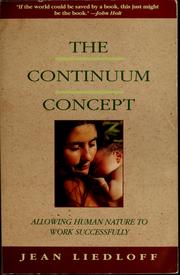Check nearby libraries
Buy this book

The child-care habits and emotional security of the Yequana Indians of Venezuela provide the bases for a system of caring for children during their first six months that stresses physical contact, warmth, and love.
Check nearby libraries
Buy this book

Previews available in: English
Subjects
Maturation (Psychology), Social life and customs, Socialization, Yecuana Indians, Child Development, Child rearing, Parent and child, Natural birth vs. Traumatic Birth, Infancy Life Effects on Rest of LIfe, Mothering, Motherly love, Importance of Mother-Baby Vibration, Psychology, Indians of south america, social conditions, Venezuela, social conditions, Human behavior, Interpersonal Relations, Social IdentificationPeople
Jean LiedloffPlaces
London, Ciudad Bolivar, BoliviaTimes
1997Showing 3 featured editions. View all 11 editions?
| Edition | Availability |
|---|---|
| 1 |
zzzz
|
|
2
The continuum concept: allowing human nature to work successfully
1985, Addison-Wesley
in English
0201050714 9780201050714
|
aaaa
|
|
3
The continuum concept: allowing human nature to work successfully
1985, Addison-Wesley
in English
0201050714 9780201050714
|
eeee
|
Book Details
Edition Notes
"A Merloyd Lawrence book."
Includes index.
Classifications
The Physical Object
ID Numbers
Work Description
Contents
INTRODUCTION : Some Reports and Thoughts for the New Edition / ix
ONE : How My Ideas Were So Radically Changed / 3
- Seeing first, understanding later, then going back to confirm my observations
- Arriving at the Continuum Concept
TWO : The Continuum Concept / 21
- What a human being is evolved to expect from life
- His inherent tendencies
- How the continuum works, in the individual and in the culture
THREE : The Beginning of Life / 29
- Natural birth and traumatic birth
- The expectations and tendencies of the infant
- The in-arms phase and its consequences in the rest of one's life
- The experience of infants and babies within the continuum, and without
FOUR : Growing Up / 76
- What it means to be a social animal
- The innate Talent for Self-Preservation, the growth of self-reliance, and the Importance of respecting the child's responsibility for himself
- The assumption of innate sociality and its implications
- How a child educates himself
- The kind of assistance required of his Edlers
FIVE : Deprivation of Essential Experiences / 109
- The blind search for the missed expenences in every corner of life
- The hard drug-addict's secret
- Myths of the fall of man
- The two steps away from the state of grace: Man's evolved ability to make an intellectual choice & civilized man's derailment from the continuum
- Relief from thinking, meditation, ritual, and other thought erasers.
SIX : Society / 137
- Cultures that suit and cultures that conflict with the continuum
- Conformity. reliability. the right not to be bored
- Whatever became of joy?
SEVEN : Putting Continuum Principles Back to Work / 151
- Sex and "affection": distinguishing between the two needs for physical contact t As need continues, so does the possibility of fulfillment
- Understanding and defining our needs from the continuum standpoint
- Obstacles In our present way of life
- The rights of babies
- Approaches to reinstating the continuum In ways open to us
- Applications of these principles to research
INDEX / 165
`Excerpt from this book; Page 1: "This book is meant to propound an idea, not tell a story, but I think there is a purpose to be served in telling a little of my history, something of the preparation of the ground in which the concept took root. It may help explain how my views departed so far from those of the twentieth-century Americans among whom I grew up. I went to the South American jungles with no theory to prove, no more than normal curiosity about the Indians and only a vague sense that I might learn something of significance. In Florence, on my first trip to Europe, I was invited to join two Italian explorers on a diamond-hunting expedition in the region of Venezuela's Caroni River, a tributary of the Orinoco. It was a last-minute invitation and I had twenty minutes to decide, race to my hotel, pack, dash to the station, and jump on the train as it was pulling away from the platform. It was very dramatic, but rather frightening when the action suddenly subsided and I saw our compartment piled with suitcases, reflected in the light through the dusty window, and realized I was on my way to a genuine jungle. There had not been time to take account of my reasons for wanting to go, but my response had been instant and sure..."
Community Reviews (0)
Feedback?| July 21, 2024 | Edited by MARC Bot | import existing book |
| December 12, 2023 | Edited by MARC Bot | import existing book |
| July 17, 2023 | Edited by ImportBot | import existing book |
| November 17, 2022 | Edited by ImportBot | import existing book |
| July 8, 2011 | Created by ImportBot | import new book |














